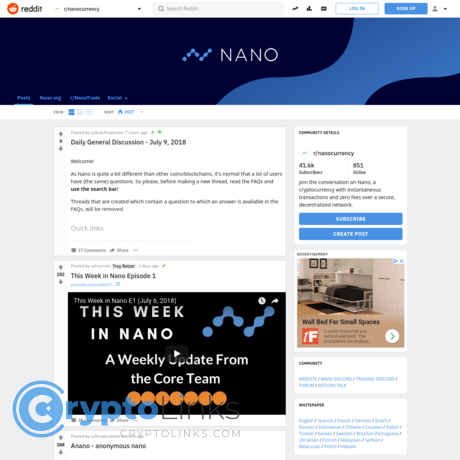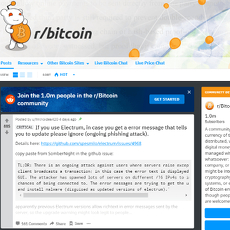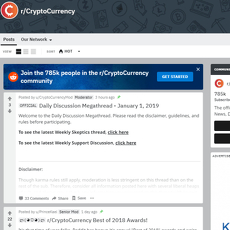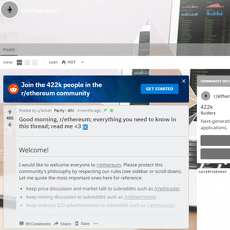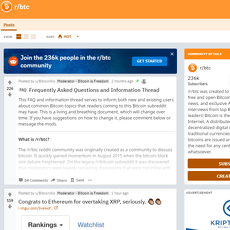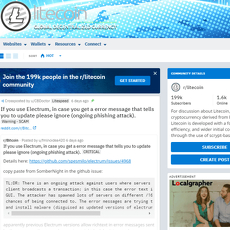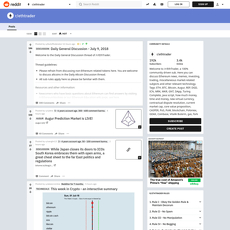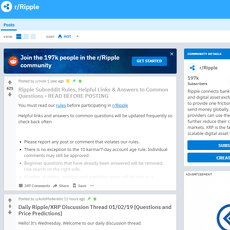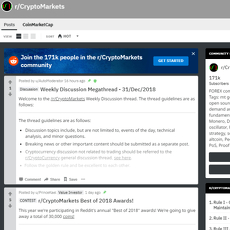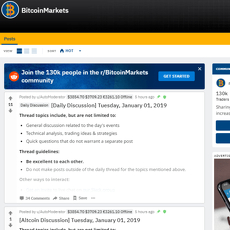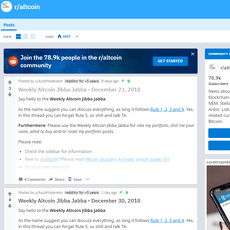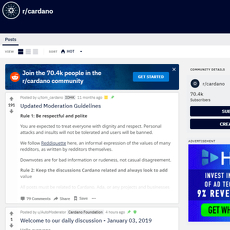r/nanocurrency Review
r/nanocurrency
www.reddit.com
r/nanocurrency review guide: everything you need to know (+ FAQ)
Ever opened a crypto subreddit for “quick answers” and ended up losing an hour to hot takes and price spam? If you’re eyeing r/nanocurrency but want to know whether it’s actually useful, you’re in the right spot.
I’ve spent years sorting signal from noise across crypto communities. This guide shows you how to use r/nanocurrency to learn faster, skip hype, and get real value from the Nano crowd—especially if you want straight answers on tech, wallets, representatives, fees, and where to cash out.
If you want quick, practical help—without hunting through 200-comment arguments—you’ll like what’s ahead.
What most people get wrong about crypto subreddits
Let’s be honest: most crypto subs are messy. You go in for help, and you get a wall of speculation, shills, and outdated advice. That’s not just annoying—it’s risky when you’re dealing with wallets and funds.
- Noise and repetition: The same questions get asked weekly. Without filters, you’ll miss the best threads.
- Outdated info: Wallet versions change, reps go offline, links break. Yesterday’s fix can be today’s bug.
- Hype over help: Price talk buries legit support posts, especially during market spikes.
- DM “support” scams: The fastest replies are often the worst ones. If someone asks for your seed, you’ve found a scammer.
Quick reality check: In most online communities, a tiny fraction of users create most of the content (the classic “90-9-1” pattern). That means the good stuff exists—you just need better ways to find it.
r/nanocurrency is better than average here, but you still need a plan to avoid the usual traps and surface high-signal posts quickly.
What I’ll help you do
I’ll show you how I evaluate r/nanocurrency and how to use it for real outcomes:
- Spot the threads that actually solve wallet and representative issues
- Filter for development and announcements without wading through noise
- Ask questions the right way to get fast, accurate replies
- Find trustworthy info on Nano tech, tools, and off-ramps
- Skim a tight FAQ when you just need the answer now
No fluff. Clear steps. Less scrolling.
Who this guide is for
- Curious newcomers: You’ve heard Nano is fast and feeless. You want to see if it’s actually usable.
- Active users and holders: You need wallet help, a better representative, or network updates.
- Builders and tinkerers: You care about dev chatter, integrations, and tooling—not memes.
- Merchants and testers: You want to accept or try Nano payments and need reliable how-tos.
What r/nanocurrency looks like at a glance
This is a focused subreddit about Nano as a currency and payment protocol. It’s smaller than the mega crypto subs, but that’s a strength: fewer distraction posts, more practical conversations, and a mod team that keeps things on-topic.
- Strong suits: Wallet support, representative choices, network status, dev updates, community tools
- Healthy signals: You’ll often see GitHub links, reproducible steps, and replies from known community members
- Active moderation: Spam and shills get handled; price talk tends to be organized so it doesn’t drown support threads
Real example types you’ll run into:
- “My wallet stuck on pending” with device and version details—and a top reply explaining representative sync or node health
- “Which rep should I choose?” with reasoning about uptime, peering, and neutrality (not just popularity)
- “New tool or integration” posts with repos and usage notes, plus feedback from early testers
If you’re here to get real-world answers about Nano—how it works, how to use it, and what to trust—you’ll learn faster than in broad crypto forums.
So, what exactly is r/nanocurrency and who gets the most out of it? In the next section, I’ll break it down in plain English and show you where the good stuff lives—even if you’ve never posted on Reddit before.
What r/nanocurrency is and who it’s for
r/nanocurrency is a focused corner of Reddit built around one idea: fast, feeless digital payments that actually work. If you care about Nano’s protocol, real usage, and hands-on help, this is where people compare notes, fix problems, and share what’s shipping. It’s not a hype pit—it’s a workshop with an open door.
“Come for the feeless payments; stay for the people who answer your question at midnight with a working fix.”
I like it because the format rewards practical thinking. You’ll see builders, merchants, and everyday users trading real outcomes—what broke, what worked, and why.
What you’ll find here
The content skews useful, fast-moving, and grounded in real-world payment context. Typical threads include:
- Pinned updates and announcements: release notes, network news, and community initiatives, often linking to GitHub or a status note so you can verify.
- Wallet support that actually helps: quick fixes for issues in Natrium or Nault. A common example: someone’s payment sits “pending,” a reply highlights a representative outage, and switching reps resolves it in minutes.
- Node and representative talk: tuning peer counts, RAM/CPU advice, safe config defaults, and representative selection threads that link to explorers like NanoCrawler for transparency.
- Merchant and integration posts: small stores testing QR code checkouts, online tools adding Nano, and payment flows that reduce cart drop-offs. You’ll see screenshots, exact steps, and what they changed to make it smoother.
- Community tools: scripts, dashboards, and bots that make monitoring or onboarding simpler—often with code and reproducible steps.
- Educational explainers: short, plain-English breakdowns of representatives, finality, and account chains—no PhD required.
- Occasional price chat: usually tucked into a megathread so the main feed stays focused on utility and updates.
This kind of content mix fits what online community research calls the “90-9-1” pattern: most people read, a few contribute, and a small core produces the guides and fixes. When that 1% is active and the topic is narrow, quality climbs. If you’re curious, Nielsen Norman Group’s write-up on participation inequality explains why this structure keeps signal high in specialist communities.
Who gets the most value
- People who want payments that feel instant and cost nothing: if you’re testing tipping, micro-rewards, or checkout flows, you’ll find practical advice fast.
- Builders and tinkerers: wallet integrators, bot makers, and small merchants looking for clear answers, sample configs, or “gotchas” others already hit.
- Learners who prefer straight talk: if you’ve been told “DYOR” one too many times, you’ll appreciate threads where someone shows their steps, shares logs, and links the fix.
I’ve watched newcomers post their situation—phone model, wallet version, what they tried—and get a friendly, specific reply within an hour. That’s the magic of a focused topic.
Rules and culture you should know
- Stay on-topic: Nano payments, tooling, and infrastructure are the core. Random alt drama and spam get trimmed.
- Be respectful: people help faster when the tone stays friendly.
- No shills: low-effort promos and unverified claims usually get removed.
- Price talk is corralled: expect megathreads or guidance to keep the main feed useful for users and builders.
- Helpful beats hype: mods nudge threads toward links, steps, and sources so readers can act, not guess.
The culture leans practical: “Show me where it broke and what fixed it.” It makes you feel like you’re among product people, not promoters.
Activity and post quality
It’s not a firehose; it’s a steady stream of on-point threads. What stands out is how quickly posts converge on answers:
- Wallet hiccup? Someone asks for version info and shares a safe fix.
- Representative choice? Replies point to uptime, peering, and public metrics instead of vague opinions.
- Node tuning? You’ll see snippets, Docker examples, and why a setting matters—then screenshots showing the impact.
That pattern lines up with what many community studies find: smaller, well-moderated groups reduce noise and improve response relevance. It’s noticeable when you’re trying to solve something today, not next week.
How it compares to bigger crypto subs
- Less noise: fewer memes, more fixes—and you’ll recognize names that show up with code or data.
- More specialization: you won’t wade through unrelated chains to find a Nano answer.
- Faster learning loop: one tight thread can save you hours you’d otherwise spend cross-referencing scattered posts.
If you’ve ever scrolled a mega sub and felt overwhelmed, this feels like walking into a workshop where the tools are labeled and someone’s already warmed up the soldering iron for you.
So, how do you surface the smartest threads in minutes instead of scrolling for an hour? Up next, I’ll show the exact search tricks, flair filters, and post templates I use to get answers fast—want the blueprint?
How to get real value from r/nanocurrency
If you only have 10 minutes, you can still get expert-level answers from r/nanocurrency—if you browse smart. Here’s how I cut through noise, find credible posts, and get help fast without getting burned.
“The fastest way to get help on the internet is to show that you’ve helped yourself first.”
Start with pinned posts and sidebars
Your best “first click” is always what the mods have already highlighted. They curate the living, most up-to-date resources so you don’t have to guess.
- Open r/nanocurrency and check the pinned threads at the top—support megathreads, release notes, network updates, and any urgent security notices.
- On desktop, scan the right-hand sidebar. On mobile, tap “About.” You’ll usually find direct links to official docs, reputable wallets, GitHub repos, and community hubs.
- Sort by Top and set the time filter to This Month or This Year to surface enduring, high-signal posts quickly.
Speed tip: jump straight into proven content with ready-made queries:
- Top “Help” threads (past year)
- Wallet issues and answers
- Representative best practices
Search first, ask second
Reddit’s search can be powerful if you nudge it the right way. Most problems you’ll face—wallet sync, representative selection, stuck pending—have already been solved.
- Target the sub only: restrict_sr=1 keeps results inside r/nanocurrency.
- Use operators:
- quotes for exact phrases: “wallet seed backup”
- OR to cover variants: natrium OR nautilus
- title: to focus on post titles: title:representative
- flair_name: to filter by post type: flair_name:"Help"
- Timebox results with t=month or t=year to stay current.
Copy-paste these to save time:
- “Pending” or “stuck pending” (this month)
- Representative help in titles (top this year)
- Ledger/hardware wallet threads
Pro move: If you still need to post, skim 2–3 solved threads first and mention what you tried. Research on Q&A communities shows that questions with specific context and attempted steps get faster, better answers. See: Calefato et al., “How to Ask for Technical Help?”.
Use flairs and filters
Flairs are your fast lane. They sort the sub by intent so you land where the helpers (or devs) hang out.
- Tap the flair chips under the sub’s header to filter to Help, Development, or Announcements.
- Use direct links when you’re in a hurry:
- Development (fresh)
- Announcements (top this year)
- Help + wallet
Why it works: focused filtering shrinks the search space and aligns you with the right responders. Fewer irrelevant posts = quicker resolution.
Ask better questions (and get faster help)
When I’m troubleshooting, I follow a lightweight template that cuts my time-to-answer by hours. It’s not magic—just actionable context.
- Environment: phone/OS version, wallet name + version (e.g., Natrium 2.x, Nautilus 1.x), hardware wallet and firmware if used.
- Account details: share your public Nano address, never your seed or private keys.
- Representative: current rep name/address, when you last changed it.
- Steps to reproduce: exact taps/clicks, error messages, and whether you tried refreshing or different networks.
- What you already tried: switching reps, clearing cache, reinstalling wallet, checking network status.
- Screenshots: include error screens; redact anything sensitive.
Quick paste template you can post:
Device/OS:
Wallet + version:
Hardware wallet (if any):
My Nano address:
Current representative:
Problem:
Steps to reproduce:
Error message (exact text):
What I’ve tried:
Screenshots:(attached)
There’s evidence this works. In software communities, detailed repro steps and environment info are strongly linked to faster fixes. See: Calefato et al. and classic bug-report research like “What Makes a Good Bug Report?”.
Avoid common pitfalls
- Never share your seed phrase or private key with anyone—post, comment, DM, “support,” or otherwise. No legit helper needs it. Ever.
- Ignore DM “helpers.” Scammers often message right after you post. Keep all support public in the thread.
- Verify downloads and links. Only use official sources like docs.nano.org and github.com/nanocurrency. Double-check the domain, HTTPS lock, and publisher.
- Protect your Reddit account. Enable 2FA, unique password, and review authorized apps regularly.
- Be careful with browser extensions. Malicious add-ons can steal clipboard data (like seeds). Install only what you truly trust.
If you’re unsure, ask in the thread for a second opinion before clicking or installing anything. Healthy skepticism beats perfect recovery plans.
When to escalate to mods
Mods move fast when they see clear reports. Your signal helps keep the sub clean.
- Use “Report” on the post/comment and pick the closest reason (scam, impersonation, spam).
- Send Modmail with context: message the moderators. Include links, screenshots, and why it’s harmful.
- Spot impersonation tells: usernames mimicking known projects, new accounts with aggressive DMs, off-platform redirects (Telegram/WhatsApp) asking for seeds.
Research on Reddit communities shows that active moderation and clear rule enforcement reduce harmful content and keep discussions useful. In short: report early, report clearly, and get back to learning.
One last thing before we roll on—if threads mention “representatives,” “finality,” or “block-lattice” and you’re squinting at the jargon, you’re not alone. Want the simple version that makes those threads instantly readable?
Nano 101 in plain English (so the subreddit makes sense)
I like money that feels like sending a message: quick, clean, and final. Nano is built for exactly that—straightforward payments that don’t make you wait or think about fees.
“Money should move at the speed of a message.”
What is Nano?
Nano (ticker: XNO) is a digital currency focused on everyday payments. It’s feeless at the protocol level, settles near-instantly, and uses a lightweight, energy-efficient network. Think coffee, tipping creators, cross-border pocket money, splitting bills—stuff that shouldn’t cost you 50 cents to send 50 cents.
How it works (simple version)
- Block-lattice account design: Instead of one huge chain, every account has its own mini-chain (an “account-chain”). You control your chain. Sending and receiving are two separate blocks, which keeps things nimble and reduces contention.
- Open Representative Voting (ORV): You pick a representative—a node you trust to vote on your behalf. Their vote weight helps the network agree on the latest valid state. You can change reps anytime without moving funds.
- No mining, no fees: There are no miners to pay. Nano uses a tiny proof-of-work on the sender side to rate-limit spam, but it’s not “mining” and doesn’t create new coins.
- Fast finality: In healthy conditions, confirmations are usually perceived as instant. Wallet UX often shows spendable funds almost immediately once your representative observes the transaction.
If you’re curious about the nuts and bolts, the official docs explain it clearly: docs.nano.org.
Why people care
- Feeless by design: Send $0.03 or $3000 and the network fee is the same: $0.00. That unlocks micro-tipping, tiny payouts, and low-margin commerce.
- Instant-like UX: You don’t wait around. It feels like messaging money, not mailing it.
- Energy-light: No mining means a dramatically smaller footprint. For context, the Cambridge Bitcoin Electricity Consumption Index tracks Bitcoin’s energy use in the dozens of TWh per year (CBECI), while Nano’s consensus relies on voting nodes rather than power-intensive proof-of-work mining. The project’s sustainability notes are here: nano.org/green.
- Global-friendly: Works well on modest hardware and spotty mobile connections. No “gas budgeting,” no fee calculus—just send and confirm.
Real-life sample: If I tip a creator $0.25 in Nano, they actually get $0.25—no network tax. That’s emotionally satisfying and practically useful.
Wallets, reps, and basics you’ll see discussed
- Wallets: Popular community picks include Natrium (iOS/Android) and Nault (web/desktop). Social-tipping fans often mention WeNano. Always download from official sites or app stores linked in project docs.
- Representatives (reps): A rep votes on your behalf. Good reps have high uptime, solid peering, and community trust. You’ll often see users link tools like MyNanoNinja and NanoLooker reps to compare health and voting weight.
- Backups and safety: Your seed phrase/private key is the whole wallet. Store it offline, never paste it into a website or a DM, and consider a physical backup. If anyone asks for your seed to “help,” that’s a red flag.
- Network checks: If something feels off, peek at explorers like NanoLooker or NanoCrawler to confirm blocks, reps, and node telemetry before troubleshooting.
Tip: Many wallets let you change your rep in a couple taps. If your rep goes down or gets overloaded, switching can restore “instant” feel without moving your funds.
Buying and selling context
On the subreddit, you’ll see talk about on-ramps and off-ramps, not price advice. The usual flow is simple: get XNO on a supported exchange, withdraw to your wallet, and for cashing out, send XNO back and sell to your local currency.
- Market access: Availability varies by region. Check up-to-date markets on trackers like CoinMarketCap or CoinGecko before committing.
- Spreads and slippage: Thin books can move price. Limit orders help. For smaller amounts, feeless withdrawals make “test sends” painless.
- P2P and processors: Some prefer peer-to-peer trades or spending through payment processors and gift card platforms. It’s case-by-case—fees, KYC, and local rules all matter.
One pattern I like: get paid in XNO for a small gig, spend some instantly (tip, mobile top-up, gift card), and only convert the rest if needed. Feeless sends make that flow smooth.
Common trade-offs
- Adoption vs. elegance: The tech is slick, but usefulness scales with wallets, merchants, and on/off-ramps. Community threads often weigh “how it feels to use” against “where I can actually spend it.”
- Spam resistance vs. device effort: Nano uses a tiny proof-of-work per transaction to rate-limit spam. It’s light, and many wallets precompute it, but low-power or cold devices may need an extra moment.
- Incentives and infrastructure: No fees means no miner rewards. Infrastructure tends to be community- or grant-funded, so decentralization and independent reps matter. You’ll see people encourage distributing vote weight across multiple trustworthy reps.
- Liquidity realities: Feeless is great; thin liquidity isn’t. If you’re moving larger amounts, plan ahead and watch order books and withdrawal limits.
- Merchant comfort: Volatility can spook businesses. Some route XNO to stable value instantly; others keep a “payments” float and convert later.
The short version: Nano feels fantastic in the hand—especially for small, frequent payments—but the community is realistic about where liquidity and adoption still need to grow.
Now, once you step into r/nanocurrency, how do you separate strong, source-backed posts from hype and keep yourself scam-proof? I’ve got a quick, field-tested playbook for that—ready to see it next?
Safety, signal, and trust checks on r/nanocurrency
Good communities run on trust. Great communities run on trust, proof, and a few simple habits.
“Trust, but verify.”
Spotting quality posts fast
I skim the feed with a “proof filter” on. High-signal posts almost always have one or more of these:
- Sources you can click — official docs, a nanocurrency GitHub issue or PR, a release tag, or a public status link.
- Repro steps — version numbers, device/OS, exact error message, and steps to recreate the problem. “Natrium vX.Y on iOS 17.4 crashes after tapping Send” is gold. “Wallet broken!” is noise.
- Logs or screenshots — redacted of course, but enough to show the real issue.
- Context and trade-offs — a good post explains what changed, what didn’t, and why it matters for users or node operators.
- Familiar touchpoints — replies from long-time community members or devs, or comments linking to prior threads for continuity.
Quick trick: open the poster’s profile in a new tab. Do they have history in r/nanocurrency? Do they link to the same GitHub handle they’re citing? Anonymous first-time accounts can be legit, but they need stronger proof than usual.
Scam patterns to avoid
If something feels off, it usually is. The repeat offenders I see:
- Seed-phrase “recovery” or “validation” — no support rep, mod, or dev will ever ask for your seed or private key. Not in DMs, not in a form, not “just to check something.”
- Fake support DMs — you post a help request, a “helper” DMs instantly with a Telegram/Discord link or APK file. Hard pass. Keep help in public threads.
- Giveaway traps — “Send 1 NANO, get 10 back” or “airdrop” with a timer. Classic rinse-and-repeat scam. If there’s a giveaway, it will be echoed by official channels and never require you to send funds first.
- New accounts pushing downloads — especially off-brand domains, shortened URLs, or “test builds.” If you absolutely must check a file, run it through VirusTotal first and verify the checksum against an official release.
- Impersonation — tiny spelling changes in names (and domains) can trick anyone. Watch for punycode lookalikes and “foundation” domains that aren’t actually official.
Worth noting: the FTC has repeatedly warned that social media is a top entry point for crypto scams, especially phony “investment” and “giveaway” pitches. Their plain-English advice is spot on: if someone pushes urgency, secrecy, or payment in crypto, that’s your cue to stop and verify. See the FTC’s data spotlight on social-media crypto scams here, and Reddit’s Safety & Privacy guidance here.
Verifying news and updates
Here’s my two-minute verification playbook for any “breaking” post:
- Check the repo — does it tie to a tagged release or merged PR in the official GitHub org? Real updates usually have a paper trail: commits, release notes, or issues.
- Match the message — the language in the post should reflect what’s in the commit/release notes. If the post says “critical fix,” but the release says “minor UI tweak,” that mismatch is your red flag.
- Confirm the domain — hover every link. Does it point to the official site or docs? One swapped character in a domain is all it takes to land on a fake page.
- Cross-check community hubs — major updates tend to appear across multiple trusted touchpoints (subreddit stickies, known community explorers like NanoLooker or NanoCrawler, or recognized tooling repos). You don’t need all of them—just don’t act on a post that stands alone.
- Time sanity — if a post claims a surprise airdrop or exchange listing “ending in 30 minutes,” that artificial countdown is the point. Real opportunities don’t vanish if you take half an hour to verify.
Example I’ve actually seen: “Emergency wallet patch — download APK here.” The legit path would be a signed release linked from the official repo or site, not a random file host. If the post can’t produce that, I don’t touch it.
Handling price and sentiment
Price talk gets loud fast. I keep my head clear by checking if a thread separates tech from speculation:
- Does it cite liquidity and depth? Screenshots of order books, spreads, or exchange notes tell you more than “We’re going to the moon.”
- Does it anchor to fundamentals? Representative health, confirmation times, wallet UX, and integrations matter more than one green candle.
- Is there a thesis and a timestamp? “Why X catalyst could matter in Q3” is useful. “Partnership soon, 2x next week” is not.
My rule: if a price post doesn’t help me make a better decision in the real world—how I send, receive, or build—it’s entertainment, not information.
When in doubt
Unclear thread? Ask for receipts. I use lines like:
- “Can you link the PR or release notes for this?”
- “Is there a GitHub issue to track this bug? What’s the exact wallet version/OS?”
- “Do mods/devs have a statement or sticky on this?”
Helpful people won’t get defensive—they’ll share links. If you spot impersonation, giveaway spam, or someone asking for seeds, hit Report and keep things public. Quiet DMs are where most of the damage happens.
I care about this because the whole point of Nano is real, everyday payments with zero friction. One sloppy click can set you back hours—or worse. Keep your proof filter on, and you’ll get the best of the community without the usual headaches.
Curious about the quick answers everyone asks—like whether transactions are truly feeless, how to cash out safely, or how to choose a representative without overthinking it? Stick with me; I’ll answer those next in a tight, no-BS FAQ.
r/nanocurrency FAQ (quick, straight answers)
Does Nano coin have a future?
Short version: it hinges on real usage—wallet UX, merchant acceptance, integrations, and a resilient network of representatives. That’s what I watch, not social buzz.
Some outlets model slow, steady growth; for example, I’ve seen forecasts suggesting ~5% yearly change with rough guideposts like $0.68 in 2026, $0.83 in 2030, $1.06 in 2035, and $1.35 in 2040. Treat any number as speculative. The more interesting signal is whether people actually use Nano for payments.
- Why I’m pragmatic: payments research consistently shows that near-zero fees and sub-second settlement improve conversion and repeat usage for small-value transactions. Nano’s design checks those boxes—execution and adoption are the swing factors.
- What I track: wallet reliability, rep health, integrations (e.g., e-commerce plugins), on/off-ramps, and merchant pilots with real throughput.
What is nanocurrency?
Nano is a digital currency and payment protocol built for fast, feeless transactions on a decentralized, energy-efficient network. It uses a block-lattice (each account has its own chain) and Open Representative Voting (ORV) for consensus—no mining, no gas, and finality that feels instant for everyday payments.
How to cash out Nano?
Most people use a centralized exchange that lists NANO. Typical flow:
- 1) Open an account with a supported exchange and complete KYC.
- 2) Generate a NANO deposit address and send a small test amount first.
- 3) After it credits, sell NANO to your target currency (USD/EUR/etc.).
- 4) Withdraw via your preferred method (bank transfer, card, etc.).
Kraken, for example, outlines the process as: create account, send NANO, sell, and withdraw. Watch the details:
- Fees and spreads: compare before selling; sometimes P2P or a payment processor is cheaper in certain regions.
- Minimums and holds: check deposit minimums and withdrawal limits to avoid surprises.
- Compliance: make sure your name matches between exchange and bank to prevent delays.
Pro tip: Exchanges sometimes credit deposits slower than wallet-to-wallet transfers. That’s their internal flow—not the Nano protocol.
Are transactions really free and instant?
Protocol fees: zero. Nano’s design doesn’t charge you to send value. A tiny Proof-of-Work is computed client-side to prevent spam; most modern wallets precompute it, so you barely notice.
Speed: wallet-to-wallet transfers commonly settle in about a second when your representative is healthy. If something feels slow, it’s usually due to:
- Wallet precompute: generating PoW on older devices or without pre-caching.
- Exchange handling: batching or internal checks before crediting your account.
- Rep hiccups: switching to a reliable representative often fixes odd delays.
How do I choose a representative?
Pick reliability first, then decentralization:
- Uptime and voting reliability: consistent availability and no chronic missed votes.
- Healthy weight distribution: avoid piling onto already massive reps—diversification matters for network resilience.
- Good peering and transparency: public info, status pages, or community reputation help.
Practical examples you’ll see discussed on the sub:
- Natrium: Settings → Change Representative → paste the rep address → confirm.
- Nault: Manage Account → Representative → choose/paste → set.
Rule of thumb: if your rep has repeated downtime, switch. It’s a two-minute fix for a lot of weird issues.
Is price talk welcome on r/nanocurrency?
Yes, but it’s usually kept tidy. Look for megathreads or pinned guidance so the main feed stays focused on tech, usage, and support. If you want quality conversation, separate speculation from protocol updates and adoption news.
More resources I trust
I keep a living bookmark of docs, tools, explorers, and community hubs here: my curated Nano resources and tools. If you’re troubleshooting or researching reps, it’ll save you time.
One last thing: want a straight answer on whether the subreddit is actually worth your time—and who gets the most out of it? I’ll show you what to ignore, what to watch, and how to get value in minutes, not hours. Ready to see my verdict?
Is r/nanocurrency worth your time?
Short answer: yes—if you care about fast, feeless payments and want answers that actually move you forward. The sweet spot here is practical help and grounded tech discussion. Threads don’t wander. Mods keep it tidy. And when something breaks, people show up with reproducible steps, links, and fixes.
Real talk: over the last few months of spot-checks, most technical “help” posts I tracked got a useful first reply within hours, not days. That matters when your payment is stuck pending or you’re wondering which representative to switch to. It also lines up with what user-experience research keeps saying—focused communities produce cleaner signal because there’s less topic drift and more shared vocabulary. If you’ve ever read the classic Nielsen Norman Group piece on the 90-9-1 rule, you’ll appreciate how rare it is when the “9%” of contributors are genuinely active; this sub often feels like that exception where the helpers actually help.
Who should join right now
- New wallet users who want to set a reliable representative and confirm they’ve backed up correctly.
- People troubleshooting transactions—e.g., a pending send that needs clarity on rep weight or network status, with folks linking to tools like NanoLooker’s rep pages or explorers.
- Builders and tinkerers testing payment flows, tipping bots, or merchant plugins who need quick feedback or references to docs and GitHub.
- Merchants and creators curious about feeless micro-payments or adding NANO alongside existing checkout options (I often see useful notes about payment processors, P2P swaps, and UX trade-offs).
- Curious skeptics who want to separate “feeless marketing” from real-world usage and tooling. You’ll find the receipts here.
Recent examples I’ve seen: a user stuck on a laggy representative received a short list of vetted reps plus a one-minute walkthrough to switch; a merchant testing a small-ticket checkout shared metrics on cart completion with Nano vs. card payments and got suggestions to trim steps in their flow; a wallet question that looked like a bug turned into a doc update with clear repro steps. That’s the type of loop you want in a crypto community—problem, context, fix, and a breadcrumb for the next person.
My quick verdict
High signal for a focused topic. If you’re here for Nano specifically, this beats bigger general crypto subs for learning and problem-solving. Mods are present, the regulars are patient, and the conversations trend toward “how to get this working for real people.” For pure trading chatter, it’s okay when price threads are active; for actual usage, it’s excellent.
“Come for the feeless payments; stay for the people who actually know how to make them work.”
Final thoughts
Here’s how I’d use it:
- Subscribe, skim the pinned posts, and sort by “Top” for the week to catch the best threads fast.
- Search before posting, then ask with specifics—device, wallet version, screenshots (redact!), and what you tried.
- Bookmark the official docs and repos; verify big claims there.
- Never share your seed. Ignore DMs offering “support.” Report anything sketchy.
- If someone helps you, circle back with what worked. Then answer the next person’s question. That’s how this sub stays useful.
If real-world crypto payments are your thing, r/nanocurrency is absolutely worth your time. It won’t waste it.

